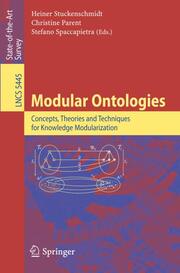Detailansicht
Modular Ontologies
Concepts, Theories and Techniques for Knowledge Modularization, Lecture Notes in Computer Science 5445 - Theoretical Computer Science and General Issues
ISBN/EAN: 9783642019067
Umbreit-Nr.: 1108817
Sprache:
Englisch
Umfang: x, 378 S.
Format in cm:
Einband:
kartoniertes Buch
Erschienen am 25.05.2009
Auflage: 1/2009
- Zusatztext
- This book constitutes a collection of research achievements mature enough to provide a firm and reliable basis on modular ontologies. It gives the reader a detailed analysis of the state of the art of the research area and discusses the recent concepts, theories and techniques for knowledge modularization. The 13 papers presented in this book were all carefully reviewed before publication. They have been organized in three parts: Part I gives a general introduction to the idea and issues characterizing modularization and offers an in-depth analysis of properties, criteria and knowledge import techniques for modularization. Part II describes four major research proposals for creating modules from an existing ontology either by partitioning an ontology into a collection of modules or by extracting one or more modules from the ontology. Part III reports on collaborative approaches where modules that pre-exist are linked together through mappings to form a virtual large ontology.
- Kurztext
- This book constitutes a collection of research achievements mature enough to provide a firm and reliable basis on modular ontologies. It discusses the recent concepts, theories and techniques for knowledge modularization.
- Autorenportrait
- InhaltsangabeModularization Approaches.- to Part I.- An Overview of Modularity.- Formal Properties of Modularisation.- Criteria and Evaluation for Ontology Modularization Techniques.- On Importing Knowledge from Ontologies.- Modularity in Databases.- Partitioning and Extraction of Modules.- to Part II.- Extracting Modules from Ontologies: A Logic-Based Approach.- Structure-Based Partitioning of Large Ontologies.- Web Ontology Segmentation: Extraction, Transformation, Evaluation.- Traversing Ontologies to Extract Views.- Connecting Existing Ontologies.- to Part III.- Formal and Conceptual Comparison of Ontology Mapping Languages.- Ontology Integration Using ?-Connections.- Composing Modular Ontologies with Distributed Description Logics.- Package-Based Description Logics.
